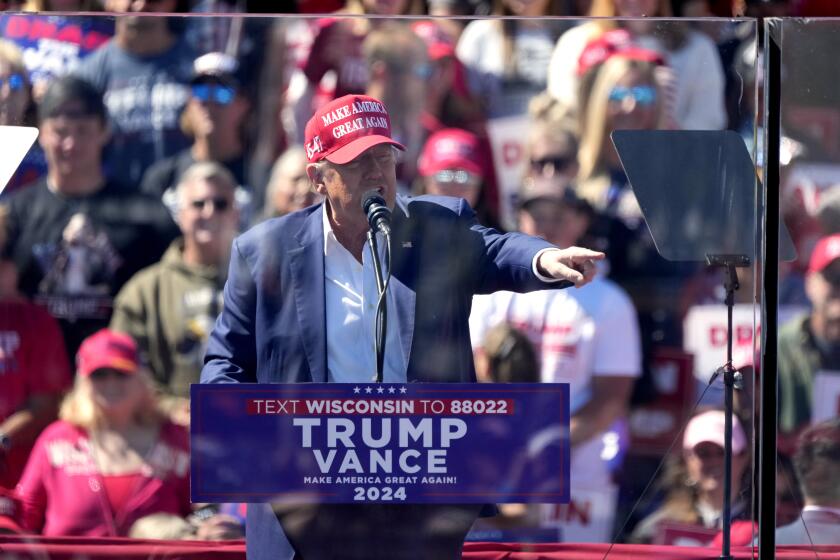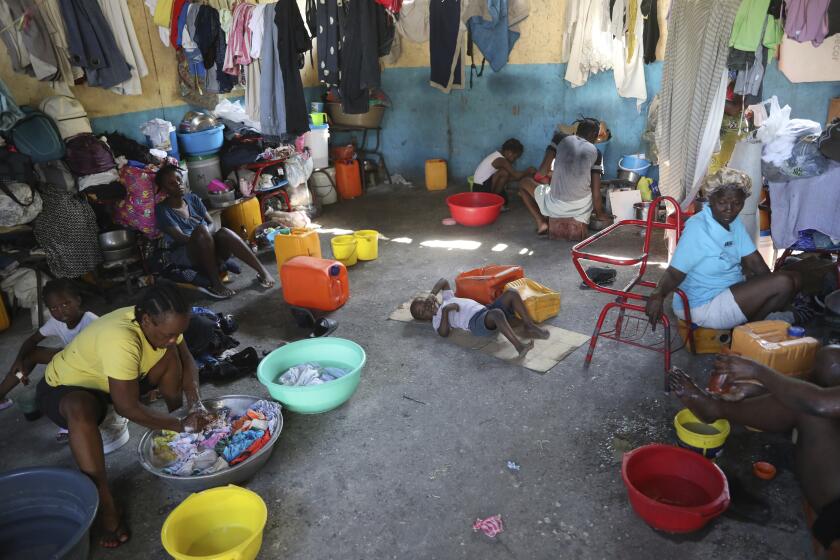Kabila Sworn In as Zaire President, Promises Elections
Two weeks after chasing a hated dictator from power, guerrilla leader Laurent Kabila had himself sworn in as president here Thursday, telling a stadium filled with 30,000 cheering supporters that he would guide the nation to free elections in April 1999.
The inauguration, broadcast live on state-run television, was conducted by 22 Kabila-appointed judges wearing red robes trimmed with leopard skin, and witnessed by the presidents of neighboring African countries that had supported him during his guerrilla war.
It came a day after Kabila had given himself broad powers to govern without a legislature until a new constitution can be adopted. Besides ruling by decree, he now has the power to hire and fire civil servants, including judges, and act as military commander in chief. Earlier, he had banned public demonstrations and temporarily prohibited multi-party politics.
Kabila, 56, wearing a black safari suit, promised to rebuild the nation left in ruins by ousted leader Mobutu Sese Seko, who had amassed a fortune by stealing from the country’s vast mineral resources.
“We should start from the beginning,” Kabila told the crowd, many of whose members had waited hours beneath a sweltering sun for the ceremony. He said presidential and legislative elections would be held by April 1999. “That’s a promise,” he said.
Several representatives of European countries attended the swearing-in, along with heads of state from Rwanda, Burundi, Angola, Uganda and Zambia--and a band of anti-Kabila protesters who ran around the arena’s track singing the now-outdated national anthem.
Kabila arrived at Kamanyola Stadium by motorcade about 2 p.m. and, his bald head gleaming in the brilliant sunlight, walked a short distance to a microphone. The onetime bush fighter, unknown to most Zairians before he launched his revolt last year, then proudly raised his right hand and pledged “fidelity” and “obedience” to the nation he has re-christened the Democratic Republic of Congo.
Spectators in the stands held scores of signs and banners wishing Kabila good luck, good health and long life.
Kabila then climbed into the stands to another microphone and delivered his first public address to the nation since taking over the government earlier this month.
Onlookers waved their arms in the air and cheered as he outlined plans for rebuilding the country socially and economically. Unemployment will be erased, an efficient transportation network will be established in an attempt to physically unite the country and a new currency--the Congolese franc--will be created, he said.
“The point is not to assure the continuity of the old regime but to build a new state based on new values and kick out Mobutuism,” he said.
Kabila promised that the constitution will be rewritten and a referendum on it held by the end of 1998, followed by the elections in 1999.
Kabila’s critics are only cautiously optimistic about the prospect that he will carry out this promise, which would give Zaire its first democratic elections in more than three decades.
Kabila’s Kinshasa supporters, who call him “Papa Kabila” and “The Liberator,” had waited for more than five hours in the scorching midday heat for the swearing-in to get underway. But most appeared unperturbed by the delay.
“Kabila has come to redeem us,” said Biaba Osuene Erorosi, a 55-year-old Supreme Court clerk, as he settled into the front-row seats designated for doctors, lawyers and civil servants. “He has saved us from a terrible situation.”
Erorosi, who professed longtime support for the anti-Mobutu forces, said it was unclear whether he would be allowed to keep his post.
“I’m very, very excited,” said 57-year-old Justin Mamboleo, director of the former government’s Fund for Cultural Promotion. “The old regime was a group of bandits. Now I’m an optimist.”
Girls dressed in red jackets and white miniskirts hopped, twirled and gyrated to the rhythms of a marching band. A military ensemble marched around the arena, basking in cheers from the crowd.
A group of about 500 students came out of the stands and ran around the track in a clear attempt to disrupt the event. They chanted anti-Kabila slogans, shouting, “Mobutu started his dictatorship the same way!”
“They’re just trying to cause trouble,” said Jacques Boy Lumbwelle, president of the Assn. of Journalists for Democracy. “This is simple provocation.”
More to Read
Sign up for Essential California
The most important California stories and recommendations in your inbox every morning.
You may occasionally receive promotional content from the Los Angeles Times.










